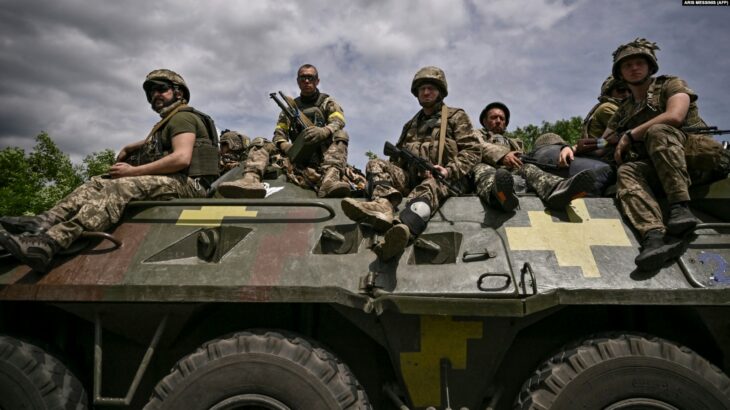
Ukrainian forces came under fresh pressure from Russian troops amid fierce fighting for control of the eastern city of Syevyerodonetsk, regional governor Serhiy Hayday said on June 6, a day after he said Ukrainian counterattacks had managed to partially push back the invaders.
“Our defenders managed to undertake a counterattack for a certain time; they liberated almost half of the city. But now the situation has worsened a little for us again,” Luhansk regional Governor Serhiy Hayday told national television.
Hayday warned that he expects the Russians to redouble their indiscriminate artillery bombardments that have turned much of the region into rubble.
The railway hub has been under relentless Russian shelling for weeks but remains fiercely contested, with the Russians at some point last week controlling 80 percent, according to Hayday.
Russian troops are now targeting Slovyansk, in the Donetsk region of eastern Ukraine, and have resumed their offensive near Svyatyhorsk, some 20 kilometers north of Slovyansk, suffering losses, the General Staff of Ukraine’s armed forces said.
British intelligence suggested on June 6 that the Russian troops’ push toward Slovyansk is part of their attempted encirclement of Ukrainian forces.
Early on June 6, explosions were heard in the southern Ukrainian city of Mykolayiv, Mayor Oleksandr Senkevych said in a post on the Telegram messaging service.
As the seesaw battle raged on for Syevyerodonetsk, Ukrainian President Volodymyr Zelenskiy visited troops in the southeastern region of Zaporyzhzhya to thank them for their service and sacrifice, his office said on June 5.
“I want to thank you for your great work, for your service, for protecting all of us, our state,” Zelenskiy told his forces in a statement. He also held a moment of silence for fallen troops.
Meanwhile, Britain said it would follow Washington and send long-range missile systems to Ukraine, defying warnings from Russian President Vladimir Putin against supplying Kyiv with the advanced weapons.
Defense Secretary Ben Wallace said the M270 multiple-launch rocket system will help Ukraine defend itself against Russia. No number was cited, but according to sources quoted by the BBC there will initially be three systems.
The United States announced last week it was also supplying a HIMARS rocket system that can fire rockets precisely to a distance of up to 80 kilometers.
U.S. President Joe Biden said he would provide the HIMARS system to Ukraine after being assured it would not be used to strike targets inside Russia.
The Ukrainians had requested the longer-range systems that can hit targets up to 300 kilometers away in order to be able to strike in the rear of Russian forces, but Washington was reluctant to provide them.
The British M270 multiple launch rocket system can fire 12 surface-to-surface missiles within a minute and can strike targets within 80 kilometers with pinpoint accuracy. However, the technical description of the M270 says that, depending on munitions used, it can reach targets as far away as 300 kilometers.
Russian President Vladimir Putin warned on June 5 that Moscow would strike new targets if Washington supplied long-range missiles to Ukraine.
Putin told Rossya-1 TV channel that if U.S. multiple-launch rocket systems (MLRS) were supplied to Ukraine, “we will draw appropriate conclusions from this and use our own weapons, of which we have enough, in order to strike at those facilities we are not targeting yet.”
Delivering new arms to Kyiv would only “drag out the armed conflict for as long as possible,” Putin said.
Explosions rocked the Ukrainian capital, Kyiv, on June 5, Ukrainian officials said.
Britain’s Defense Ministry said in its daily intelligence bulletin on June 6 that the Russian Kh-101 air-launched cruise missiles had struck rail infrastructure in Kyiv, and were “likely in an attempt disrupt the supply of Western military equipment to frontline Ukrainian units.”
“Several explosions in the Darnytskiy and Dniprovskiy districts of the capital,” Kyiv Mayor Vitali Klitschko posted on Telegram. One person had been injured but no fatalities had been reported in the missile strikes, Klitschko said.
Kyiv was last attacked on April 28, during a visit by UN Secretary-General Antonio Guterres.
On the battle front, Ukraine’s military said late on June 5 that a senior Russia-backed separatist commander had been killed in battle.
The news was first broken by Russian state media journalist Aleksandr Sladkov on June 5, who did not say precisely when and where Major General Roman Kutuzov was killed.
The Strategic Communications Administration of Ukrainian military said late on June 5 that Kutuzov had been “officially denazified and demilitarized” — a mocking reference to Putin’s declared goal of “denazifying and demilitarizing” Ukraine — while leading an attack on a village near the town of Popasna in the Luhansk region.
Several Russian generals have been killed since the February 24 start of the invasion, though Moscow has only officially confirmed the death of four. Ukraine at one point claimed that as many as seven had been killed in the conflict, only for two of them to later turn up alive.



